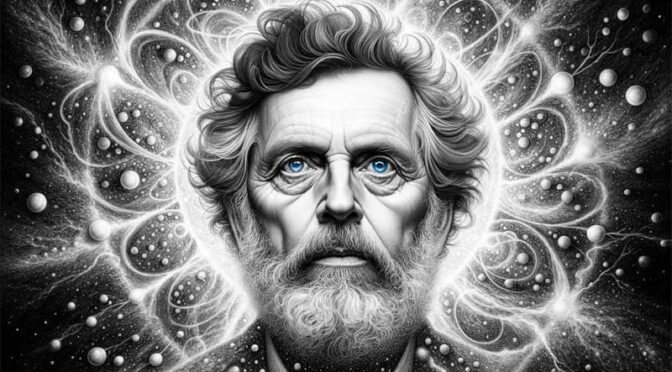Among thinkers who have pondered the nature of reality, consciousness, and the mysteries of human existence, Terence Mckenna stands out as a unique voice, blending scientific inquiry with deep spiritual introspection. Drawing from his extensive experiences with psychedelic substances, ethnobotanical research, and a myriad of ancient and contemporary philosophical ideas, Mckenna crafted a worldview that challenges conventional understandings and beckons readers to consider alternate dimensions of existence. As we navigate the depths of his theories and insights, this article will serve as a guide to understanding the profound impact and legacy of a man who dared to question the very fabric of our reality.
Contents
- Introduction to Terence Mckenna
- Background of Mckenna’s Theories
- The Stoned Ape Hypothesis
- TimeWave Zero and the Novelty Theory
- The Machine Elves and DMT Experiences
- The Nature of Reality and Perception
- Mckenna’s Views on Consciousness
- Implications of Mckenna’s Theories on Modern Thought
- Criticisms and Counterarguments
- Legacy and Influence of Mckenna’s Ideas
- Mckenna’s Impact on the Study of Consciousness
Introduction to Terence Mckenna
Terence Mckenna, a figure synonymous with the melding of ethnobotany, mysticism, and psychedelics, emerged during the latter half of the 20th century as a significant voice that sought to challenge and expand the very notions of human consciousness, the nature of reality, and the potential paths towards understanding the intricacies of human awareness.
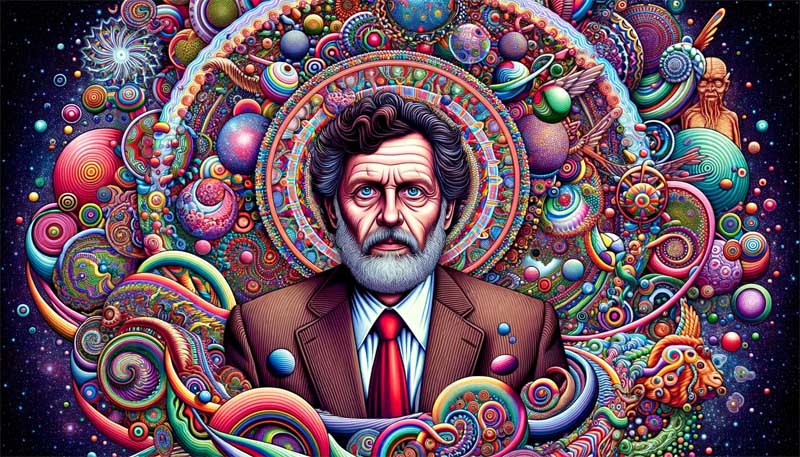
Born on November 16, 1946, and passing away on April 3, 2000, Mckenna’s relatively short life was marked by a passionate pursuit of knowledge, a deep-rooted connection to the psychedelic experience, and a fervent desire to communicate his insights and revelations to a broader audience, be it through lectures, writings, or intimate conversations. With a background in shamanism, ethnobotany, and a profound personal relationship with psychedelic substances, Mckenna’s theories, although controversial, have left an indelible mark on the fields of consciousness studies, psychedelic research, and the broader cultural understanding of altered states of awareness.
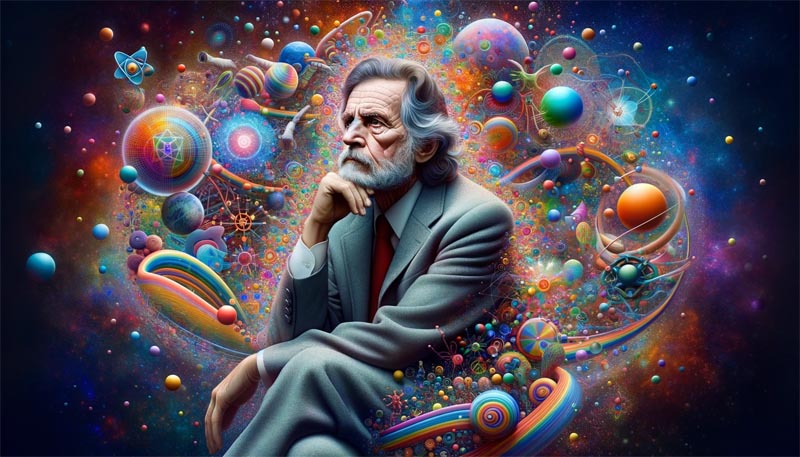
Terence Mckenna offers a unique opportunity to delve into a world where the boundaries of reality blur, where the known meets the unknown, and where the very fabric of existence is constantly questioned and redefined. This article aims to shed light on Mckenna’s most prominent theories, their implications, criticisms, and the legacy he has left behind. Whether one agrees with his views or not, the undeniable fact remains that Mckenna’s contributions have sparked discussions, debates, and introspections that continue to reverberate in the world of consciousness studies.
Background of Mckenna’s Theories
Terence Mckenna, often hailed as a modern mystic and visionary, formulated his theories based on a synthesis of numerous disciplines ranging from ethnobotany, anthropology, and history to mysticism, alchemy, and the personal experiences he garnered from his extensive travels, particularly to the Amazon rainforest, a place he often referred to as the cradle of many of his transformative insights. While a student at the University of California, Berkeley, in the late 1960s, Mckenna’s academic pursuits were deeply intertwined with the burgeoning counterculture movement, exposing him to a myriad of thoughts and ideologies that would shape his later theories, especially those pertaining to the psychedelic experience and the potential it held for unlocking deeper layers of human consciousness. Central to Mckenna’s belief system was the conviction that psychedelic plants, such as psilocybin mushrooms and ayahuasca, served as gateways to alternate dimensions of reality, a notion deeply rooted in indigenous shamanistic practices and ancient alchemical traditions. By bridging the gap between the ancient and the contemporary, the scientific and the mystical, Mckenna’s theories offer a comprehensive view of consciousness, reality, and the inherent potential of the human mind, often urging society to reevaluate its relationship with nature, consciousness, and the cosmos.
The Stoned Ape Hypothesis
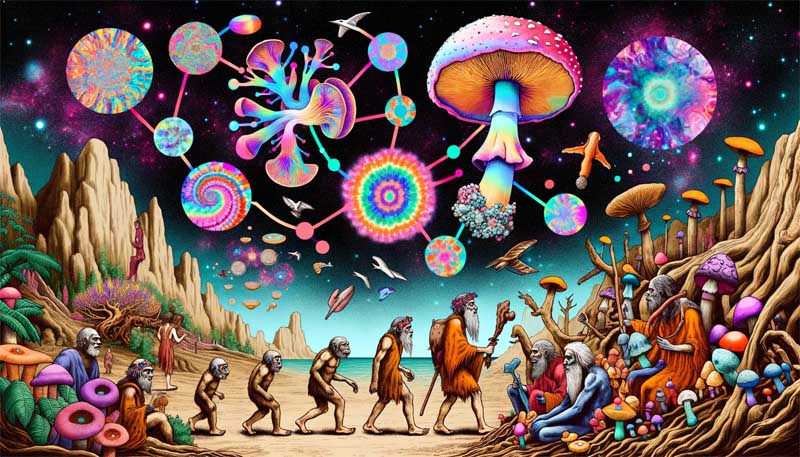
One of the most provocative and debated theories proposed by Terence Mckenna is the “Stoned Ape Hypothesis,” a speculative idea suggesting that the evolutionary leap from Homo erectus to Homo sapiens might have been influenced by the consumption of psychedelic substances, particularly psilocybin mushrooms.
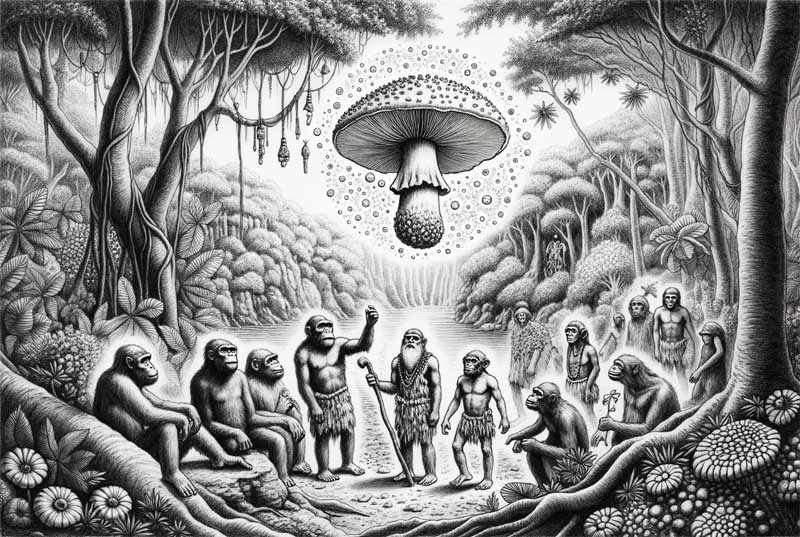
According to Mckenna, during a period of changing environmental conditions, our early human ancestors, in their quest for food, might have stumbled upon and consumed these naturally occurring psychedelic fungi, leading to a series of profound changes in their neural structures, cognitive abilities, and social behaviors. He postulated that the repeated ingestion of these mushrooms could have catalyzed the development of language, enhanced visual acuity, and fostered communal bonding and cooperation, thus providing a competitive advantage for survival. The heightened states of awareness and sensitivity induced by psilocybin, he argued, might have amplified creative thinking, abstract thought, and the capacity for introspection, traits that are distinctly human.
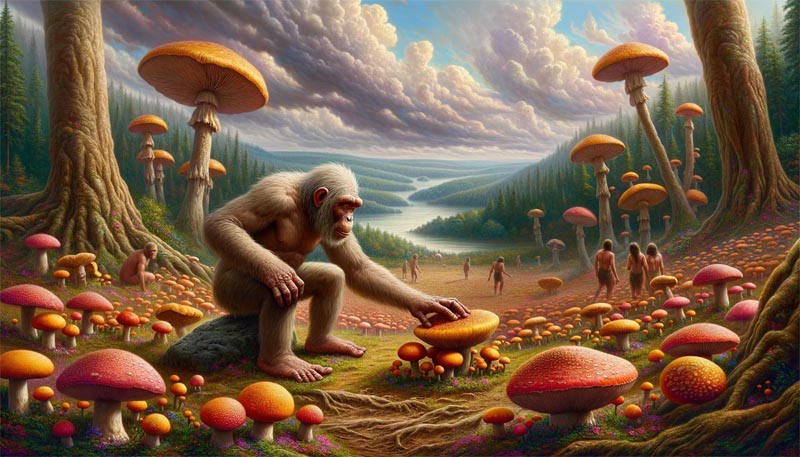
While the Stoned Ape Hypothesis remains a topic of contention and skepticism within the scientific community, its implications for understanding the origins of human consciousness and the role of psychedelics in our evolutionary history continue to intrigue and inspire discussions, research, and debates in various academic and cultural circles.
TimeWave Zero and the Novelty Theory
Diving deeper into the mind of Terence Mckenna leads us to another fascinating concept he introduced, known as the “TimeWave Zero” theory, which is intricately tied to his broader “Novelty Theory.” Rooted in a combination of his experiences with the I Ching, an ancient Chinese divination system, and his understanding of mathematics, this theory proposes a model for understanding the ebb and flow of “novelty” — defined by Mckenna as the density of complexification or the rate of change of complexity in the universe.
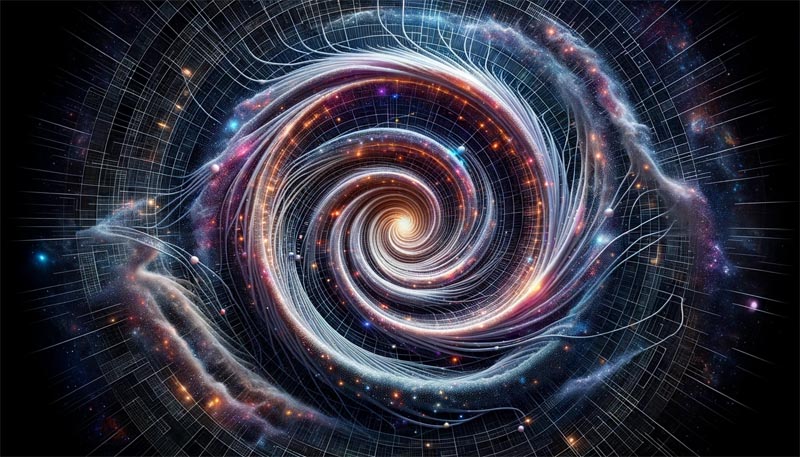
Mckenna postulated that as time progresses, events in the universe become increasingly interconnected and complex, leading to an eventual point of infinite novelty, which he termed “TimeWave Zero.” This point, he speculated, would signify an apocalyptic end or a major shift in the nature of existence, potentially linked to the technological singularity, the emergence of a global consciousness, or a transition to a higher dimensional reality. He even ventured to predict a specific date for this event, initially identifying it as December 21, 2012, aligning with the end of the Mayan calendar. While many of the specifics of the TimeWave Zero and Novelty Theory, including the predicted date, have been met with skepticism and have not materialized as anticipated, the broader idea of an accelerating rate of change and the potential implications of reaching a point of infinite novelty continue to captivate thinkers, researchers, and enthusiasts, prompting a reevaluation of our understanding of time, consciousness, and the future trajectory of humanity.
The Machine Elves and DMT Experiences
Few tales are as intriguing and mystifying as Terence Mckenna’s accounts of his encounters with entities he dubbed “Machine Elves” during his profound DMT (dimethyltryptamine) experiences.
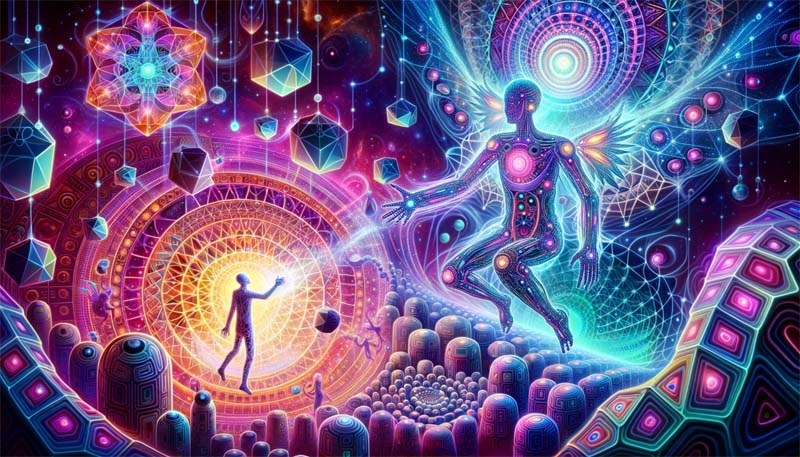
DMT, a powerful psychedelic compound found in various plants and even within the human body, is often described as the “spirit molecule” due to its ability to induce intense, otherworldly experiences within mere minutes of consumption. Mckenna’s vivid descriptions of his interactions with these seemingly sentient, self-transforming, and often playful entities in hyper-dimensional realms have become iconic within psychedelic circles.
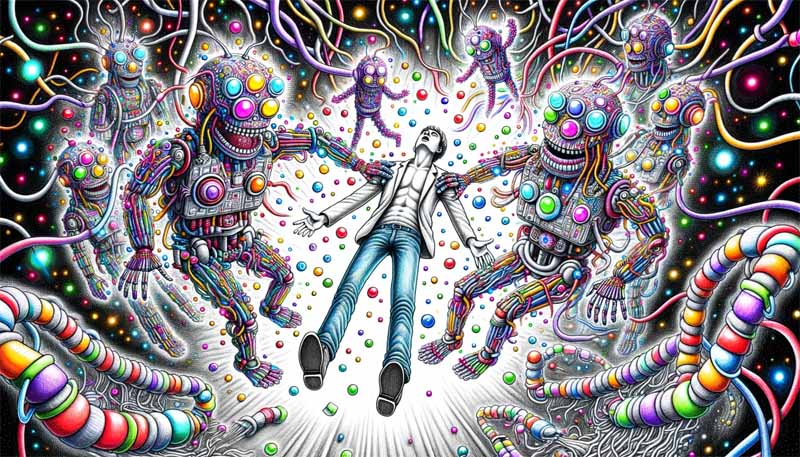
He posited that these Machine Elves, with their intricate geometric structures and propensity for communicating through visual language, might represent an alternate form of intelligence, perhaps even serving as ambassadors or gatekeepers to an interconnected web of consciousness that spans the cosmos. While Mckenna’s personal encounters were deeply subjective and rooted in his own interpretations, they opened the door to broader discussions about the nature of DMT-induced experiences, the possibility of alternate dimensions, and the potential existence of non-human intelligences. These accounts, while met with skepticism by some, have resonated with many others who have ventured into the DMT space, leading to a proliferation of similar reports, artistic representations, and philosophical musings on the nature of reality, consciousness, and the boundaries of human perception.
The Nature of Reality and Perception
Terence Mckenna’s musings on the nature of reality and perception, while deeply influenced by his psychedelic experiences, were also shaped by his readings of diverse philosophical traditions, ancient mystical practices, and contemporary scientific theories, forming a tapestry of ideas that challenge conventional paradigms. He frequently posed the question: What is reality?
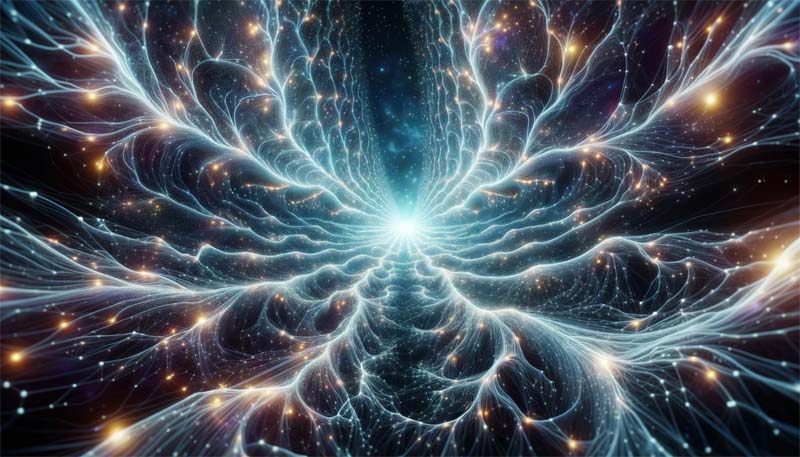
For Mckenna, the answer was neither static nor singular but a fluid construct, shaped as much by external stimuli as by the internal landscapes of individual consciousness. Arguing that reality is more of a linguistic and cultural construct than an objective truth, he emphasized the role of language in shaping and limiting our perceptions, suggesting that different linguistic systems can lead to varied interpretations and experiences of the same external events. Drawing from his encounters in the psychedelic realm, Mckenna proposed that there exist multiple layers or dimensions of reality, often hidden from our day-to-day consciousness but accessible through altered states, be it through meditation, dreams, or psychedelic substances. These alternate realities, he believed, hold clues to understanding the larger cosmos, the interconnectedness of all things, and the mysteries of existence. In this framework, perception becomes a dynamic process, constantly evolving and adapting, influenced by both our biological wiring and the cultural, social, and personal lenses through which we view the world. Mckenna’s theories, while pushing the boundaries of mainstream thought, invite readers to reconsider the very foundations of their beliefs, to question the nature of reality, and to remain open to the myriad possibilities that the universe might hold.
Mckenna’s Views on Consciousness
For Mckenna, consciousness was not a mere byproduct of biological evolution but a fundamental force permeating the cosmos, with humans representing just one manifestation of this universal phenomenon.
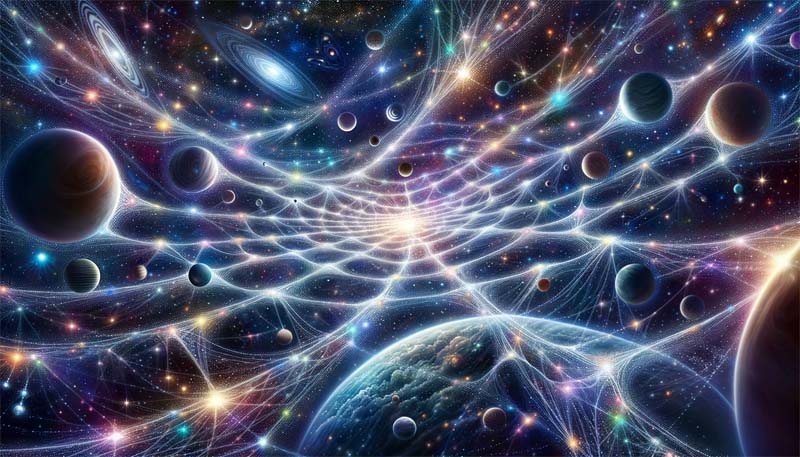
He often mused about the interconnected web of all existence, suggesting that individual consciousness is but a node in this vast network, hinting at a form of cosmic or collective consciousness. Drawing parallels from indigenous shamanistic practices and his own encounters with psychedelic substances, Mckenna proposed that plants, particularly those with psychoactive properties, might possess their own form of consciousness, serving as bridges or communicators between humans and the broader universe. Further, he postulated that psychedelic experiences, by altering the usual filters of perception, provide glimpses into alternate realms of consciousness, potentially offering insights into the nature of existence, the soul, and the afterlife. While many of his ideas challenge conventional scientific and philosophical paradigms, they have also inspired a generation of thinkers, researchers, and seekers to probe deeper into the mysteries of the mind, to question the boundaries of individual and collective consciousness, and to remain open to the endless possibilities that the exploration of inner space might reveal.
Implications of Mckenna’s Theories on Modern Thought
Terence Mckenna’s theories have reverberated far beyond the confines of psychedelic circles, influencing a wide spectrum of modern thought, ranging from the fields of anthropology and psychology to philosophy and spirituality. His emphasis on the transformative potential of psychedelic experiences prompted a renewed interest in the therapeutic and spiritual applications of these substances, leading to contemporary research on their potential benefits for mental health and well-being. Furthermore, his ideas on the nature of reality and the role of language in shaping perception have found resonance with postmodernist thinkers, challenging the foundations of objective truth and prompting discussions on the fluidity and subjectivity of individual experiences.

Mckenna’s discussions on the interconnectedness of all existence and the potential existence of alternate dimensions and realities have also found echoes in some interpretations of quantum physics, suggesting that the universe might be far more complex and multi-layered than previously imagined. Additionally, his theories on the role of plants and nature in human evolution and consciousness have influenced modern movements advocating for a more harmonious and symbiotic relationship between humans and the environment. While not all of Mckenna’s ideas have been embraced by mainstream academia, they have undeniably sparked debates, discussions, and introspections, prompting individuals to question established paradigms, explore alternate perspectives, and remain open to the boundless mysteries and potentials of the human mind and the universe at large.
Criticisms and Counterarguments
Amidst the admiration and intrigue that Terence Mckenna’s theories have garnered, there exists a parallel stream of criticism and skepticism, often emanating from academic, scientific, and philosophical quarters. Chief among the criticisms is the argument that Mckenna’s theories, particularly the Stoned Ape Hypothesis, lack empirical evidence and robust scientific backing, relying heavily on anecdotal accounts and speculative narratives. Detractors argue that while the consumption of psychedelic substances might induce profound personal experiences, extrapolating these to grand theories of human evolution, consciousness, or the nature of reality necessitates a leap of faith not grounded in established scientific methodologies. Additionally, Mckenna’s emphasis on the transformative potential of psychedelics has been viewed by some as overly optimistic, overlooking the potential risks and adverse effects associated with these substances. His interpretations of the I Ching in the context of the TimeWave Zero theory have also been critiqued for their departure from traditional understandings and for assigning arbitrary significance to specific dates. Philosophers have taken issue with some of Mckenna’s postulations on language and reality, arguing that while language does shape perception, it doesn’t necessarily limit or dictate the objective nature of reality. Despite these criticisms, Mckenna’s theories continue to inspire and captivate, serving as a testament to his ability to push boundaries, challenge conventions, and stimulate thought in areas often left unexplored by mainstream discourse. Whether one aligns with his views or stands in opposition, the debates and discussions his ideas have sparked are indicative of their enduring relevance and impact.
Legacy and Influence of Mckenna’s Ideas

With his eloquent articulation, fervent passion, and idiosyncratic theories, he has left an indelible mark on the collective psyche of those who venture into the realms of consciousness, psychedelics, and the mysteries of existence. Decades after his passing, the ripples of his influence can be felt in diverse areas, from the resurgence of psychedelic research in modern medicine to the philosophical discussions in contemporary spiritual circles. His lectures, writings, and recordings, prolifically disseminated in the age of the internet, continue to inspire new generations of thinkers, seekers, and enthusiasts, prompting them to question, explore, and wonder. Beyond the realm of psychedelics, Mckenna’s emphasis on the role of nature, the importance of preserving indigenous knowledge, and the interconnectedness of all life has found resonance in environmental movements and holistic worldviews advocating for a harmonious coexistence with the planet. Artists, musicians, and creatives have drawn inspiration from his vivid descriptions of alternate realities and the transformative potential of the human mind, weaving these themes into their works and further expanding the reach of his ideas. While the scientific and academic reception of his theories remains mixed, the cultural and societal impact of Mckenna’s ideas is undeniable. In a world often characterized by rigid structures, materialistic pursuits, and a disconnection from the deeper layers of existence, Mckenna’s legacy serves as a beacon, reminding humanity of the boundless potential within, the mysteries that lie beyond the known, and the endless journey of exploration and discovery that awaits.
Mckenna’s Impact on the Study of Consciousness
Through his personal journeys into the depths of the mind, facilitated by psychedelic substances and punctuated by moments of profound revelation, Mckenna has provided a compass for many who seek to navigate the intricate pathways of consciousness.

His theories, while not universally accepted, have introduced fresh perspectives and sparked renewed interest in areas often relegated to the peripheries of scientific and philosophical discourse. The potency of Mckenna’s impact lies not just in the content of his ideas but in the fervor with which he presented them, challenging established norms and inviting individuals to embark on their own journeys of discovery. His legacy, while multifaceted, is perhaps most profoundly felt in the realm of consciousness studies, where his voice continues to echo, urging researchers, thinkers, and seekers to push the boundaries of understanding, to question the very fabric of reality, and to remain perpetually curious about the infinite potentials and mysteries of the human mind. As the study of consciousness continues to evolve, incorporating advances in neuroscience, psychology, and philosophy, Mckenna’s contributions serve as a reminder of the value of experiential knowledge, the interconnectedness of all existence, and the endless quest for deeper understanding.

